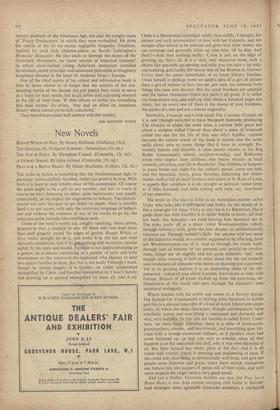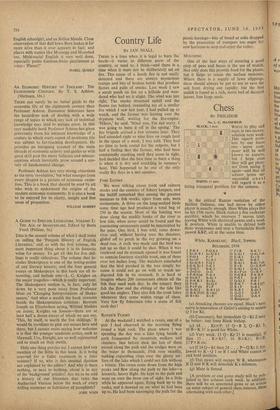New Novels
PRAY FOR A BRAVE HEART. By Helen MacInnes. (Collins, 12s. 6d.) THE artist in fiction is 'something like the Mediterranean light in painting.; unless skilfully handled, rather too good to be true. With both it is hard to steer wholly clear of the picturesque. Of course the artist ought to be a gift to any novelist; and just as much of course he isn't, behaving so often, quite legitimately and unself- consciously,'aS we expect the stage-artist to behave. The idiosyn- cracies are 'only too easy to get down on paper; what is terribly hard is to put across, with only the irrelevant language of behavi- our and without the evidence of any of his works to go by, the artist qua artist, to make him credible as such.
Three of the week's novels are, roughly speaking, about artists, painters in two, a sculptor in one. Of these only one does more than ,sniff gingerly round the edges of genius. Rough Wards ol May walks straight up to it,. and looks it in the eye and even demands credentials, and if its galugmhing. and exuberant painter called, by his niece and model, Fatuncle is not quite convincing as a genius, he is almost convincing as a painter of sorts and truly tremendous as the relative-in-the-cupboard who shames at least two sedate families in three. But this is not really Fatuncle's book, though he hovers, largely;' it' is Cissie's----or rather adolescence exemplified by Cissie, and families exemplified by Cissie's family. and growing up in general exemplified by them all, take it up,
Cissie is a Hampstead schoolgirl mildly (too mildly, I thought, for sixteen and such provocation) in love with her Fatuncle, and she escapes after school to be painted and gives him what money she can scrounge and generally tidies up after him; till he dies. And then?—And then nothing really : Cissie is just on the edge of growing up, that's all. It is a very, very attractive book, with a charm like pea-nuts, so cunning and salty you can take a lot with- out realising, and family life nearer that of the Browns in National Velvet than the cosier households of so many literary families. Cissie herself is perhaps more an adult's idea of a girl of sixteen
than a girl of sixteen in fact; too set, .t.00 sure, too immune from thing l like pain and shyness. But the small brothers.are splendid
and the minor characters (there are plenty) all good. It is rather too long-drawn-out, and ends up with about a hundred pages too many, but on every one of them is the stamp of true freshness, the quirks of a real and not a forced originality.
Inevitably, Fatuncle and Cissie recall The Constant Nympk-so it is odd (though suitable) to have Margaret Kennedy producing
The Oracles at about the same time, a curious little piece less about a sculptor called Conrad than about a piece of ironwork called (no one for the life of him sees why) Apollo: curious because the central mood of the book is elusive and the satire spills about onto so many things that it loses its strength. Ex- tremely literate and likeable, it takes hearty whacks at the Reg Butler ironmongery school, sculptor-worship, and Bohemian wives who neglect their children; less hearty whacks at loeal councils, art critics, and life in Bayswater. The children, as happens in many books too slight for the author's power, come out best, and the beautiful, bossy, pious Serafina, dedicating her storm- shelter stuffed full of small brothers and sisters to St. Rose of Lima, is superb. But somehow it is all, straight or satirical, rather limp, as if Miss Kennedy had been writing with only, say, two-thirds of her attention.
The artist in The Sun in Exile is an Australian, painter called Vicky who talks like a suffragette and looks, by the sound of it, like a cover-girl for Oggi. Vicky at any rate is no Bohemian. She is
good clean fun with freckles, it is rather horrid to know, all over her back; but beautiful—we keep hearing how beautiful she is.
The story starts off in a place called Woolloomooloo, which, through nobody's fault, gives the first chapter an unintentionally hilarious air. Through nobody's fault : but anyone with'any sense of the ludicrous would, in a context supposed to be affecting, have left Woolloomootoo out of it. And so through the whole book, through lack of humour or too personal and painful an involve- ment, things are all slightly and not quite definably 'out,' and, though often moving, it feels at other times like the too tenderly sore revelations of someone who insists on showing you a gumboil.
Yet in its groping fashion it is an interesting study of the dis- possessed: coloured men about London, Australians at odds with Europe, flotsam of all -kinds washed 'up from the enormous un- friendliness of the world and seen through the narrator's own emotional ambiguity.
Which finishes with the artists and comes to A Stormy Spring. The fashion for Victorianism is shifting from furniture to fiction and this is a pleasant example of a kind of novel I have seen about
lately, in which the main characters, though contemporary, have trisyllabic names and everything is restrained and domestic. and
very, .very ladylike. In this one the heroine is called Emily Cater- ham, the hero Julian Ellerdine, there is a tribe of great-aunts, grandmothers, cousins, and best-friends, and everything goes for- ward with a strange emotional stiffness, as if people's souls had never limbered up; so that you start to wonder, since all that happens is so flat and sniall and dull, why it was ever recorded at all. But Miss Adana has talent, plain as the day; and it is all rather well written, which is cheering and maddening at once. If she could only stop being so determinedly well-bred, and give her people some litheness and grace, make them stretch themselves and behave less like puppets (I speak still of their souls, and with some respect) she might write a very good novel.
And last a thriller. First-rate thrillers are rare, but Pray for a • Brave Heart is one. Iron curtain escaping club based in Switzer- land entangles some agreeable American amateurs, a red-haired
English schoolgirl, and an Italian blonde. Close observation of that dull town Bern Makes it far more alive than it ever appears in fact; and places with names like Moosegg and Moosbad too. Multi-racial English is very well done, especially polite German-Swiss puzzlement at jokes : 'Please?'
ISABEL QUIGLY











































 Previous page
Previous page